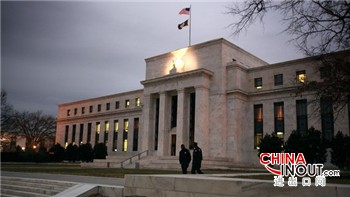这大概就是“鸽子”鸣叫时的声音。当美联储(Fed)最终宣布本月不会升高目标利率时,人们没有感到太大惊讶。令人惊讶的是美联储不加息的理由,而且这意味着投资者的关注焦点将更加迫切地移向中国。
期货市场已显示,上涨机会已下降到只有30%左右。这大部分是因为今年夏季中国对全球市场的冲击,市场普遍认为北京方面对股市下跌的反应,以及允许人民币贬值的决定都很糟糕,同时有越来越多的证据表明中国经济严重放缓。
最令人意外且不安的是,美联储在其官方声明中对此毫不避讳,美联储主席珍妮特耶伦(Janet Yellen)在随后的新闻发布会上也表达了这一观点。出于显而易见的外交原因,美联储此前从未提及过中国。但此次美联储仍尽可能明确表示正是由于中国的情况,导致自己按兵不动,且可能保持下去。
新闻发布会上最能说明问题的一句话是:“最近全球经济和金融发展可能会对经济活动有所抑制,且可能在短期内进一步下调通胀压力。”这句话无人可反驳。
市场反应表明,美联储已成功表现出“鸽派”立场——对通胀采取宽容态度,甚至超出预期。美元下跌近1%,尤其受加息因素影响,短期债券收益率大幅下跌。
至于联邦基金期货市场,今年年底上升几率已略低于50%,今年年初时其上升几率曾达到95%。交易商用该市场来赌利率何时上升。
最令人困惑的是股市的反应。美联储公布消息时,离收盘还有两个小时,对忙碌的交易应不会造成多少影响。但令人惊讶的是,标普500(S&P 500)竟以下跌报收。而从其他市场的行动来看,美联储的决定本该是支持股价上升的。
这可能是因为美联储对国际形势的坦诚,产生了令人担忧的暗示,即美联储无法控制自己的命运。现在美联储的命运不仅取决于美国经济和市场数据,还取决于地球另一端一个经济体的活动。如果中国经济继续放缓,继而输出通缩影响,那么美联储有可能继续将美国利率维持在0。
人们还有种感觉,即外国事件可能帮助做了货币紧缩的工作。中国持续很久的外汇储备积累——德意志银行(Deutsche Bank)在最近的一篇报告中将此称为“大积累”——正趋于结束。全球外汇储备在长期增长之后开始下降。
在长期抛售外汇储备以提振人民币兑美元汇率之后,中国于今年8月允许人民币贬值。
在过去十年里,可以说是外储积累才让美国利率保持在低位。由艾伦格林斯潘(Alan Greenspan)执掌的美联储曾多次提高利率,但未能推升支持信贷市场的长期债券收益率,也未能避免一场最终灾难性的信贷泡沫。格林斯潘本人认为这是一个“谜”——许多人相信,这是由中国人大量买入美国债券推动的,它压低了美国国债收益率。
如果中国经济放缓现在意味着,它将不得不开始抛售部分持有的美国国债,至少有可能带来适得其反的效果。直接抛售债券推升收益率。与此同时,与直觉不符的是,外储积累和美元之间存在明显关联。
在外储管理机构积累美元的时候,他们往往会多样化外储币种,比如欧元。这削弱了美元。因此当投资者更密切关注中国的时候,中国经济放缓阻扰美国加息的风险可能被其抛售外汇储备的影响所抵消——抛售外储将会推升美元和美国国债收益率,同时实现一些加息才会实现的效果。(中国进出口网)

This is what it sounds like when doves cry. By the time the Federal Reserve announced that its target interest rates would not, after all, be rising this month, it came as little surprise. But its reasoning did, and means that investors’ focus will move ever more urgently towards China.
Futures markets implied that the chance of a rise had dropped to only about 30 per cent. This was largely because of the shocks from China over the summer, as Beijing was widely held to botch its reaction to a stock market fall and its decision to allow its currency to devalue, while evidence mounted that its economy was slowing seriously.
What was surprising, and disconcerting, was that the Fed in its official statement, and its chair Janet Yellen in her subsequent press conference, were quite so candid about this. For obvious diplomatic reasons, China was never mentioned. But the Fed nevertheless made as clear as possible that events in China had caused it to stay its hand, and could continue to do so.
The most telling line, uncontradicted in the press conference, was: “Recent global economic and financial developments may restrain economic activity somewhat and are likely to put further downward pressure on inflation in the near term.”
Market reactions suggested that the Fed had succeeded in being even more “dovish” — lenient on inflation — than expected. The dollar dropped by almost 1 per cent while short-term bond yields, particularly exposed to rate rises, fell sharply.
As for the Fed Funds futures market, used by traders to bet on when rates will rise, the odds of an increase by the end of this year nudged just below 50 per cent. They stood at 95 per cent when the year began.
Most intriguing was the stock market. Little should be made of the hectic trading in the two hours after a Fed announcement, but it was nevertheless surprising that the S&P 500 closed down, after a decision that — judging by moves in other markets — should have supported share prices.
This may be because the Fed’s honesty about the international situation introduced the worrying implication that it is not in control of its own destiny. Now it is dependent not just on US economic and market data but on movements in an economy on the other side of the world. If China’s economy continues to slow, exporting deflation with it, then the chances are that the Fed will continue to keep US interest rates at zero.
There is also a sense in which foreign events could help do the work of monetary tightening. China’s long drawn-out accumulation of reserves — dubbed the “Great Accumulation” by Deutsche Bank in a recent report — is coming to an end. Global foreign exchange reserves, after a long period of increases, have started to decline.
China’s August devaluation came after it had spent time selling reserves to prop up its currency against the dollar.
In the last decade, reserve accumulation arguably kept US rates low. The Fed under Alan Greenspan raised rates repeatedly, but failed to push up the long-term bond yields that underpin credit markets, and failed to avert an ultimately disastrous credit bubble. Mr Greenspan himself described this as a “conundrum” — and many believed that it was driven by heavy Chinese buying of US bonds, which pushed their yields down.
If China’s slowdown now means that it will have to start to sell some of its US bonds, it is at least possible that the effect will now work in reverse. Selling bonds directly pushes up their yields. Meanwhile, counterintuitively, there has been a marked correlation between reserve accumulation and the dollar.
As reserve managers accumulate dollars, they tend to diversify them into other currencies, such as the euro. This weakens the dollar. So as investors watch China even more closely, the risk that a slowdown there thwarts a rate rise in the US could be counterbalanced by the effect of reducing its reserves, which will push up the dollar and US bond yields — and do some of the work that would have been done with a rate rise.











